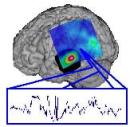Neural Signals of Brain Disorders
Co-chairs
Francois-Benoit Vialatte, Laboratory for Advanced Brain Signal Processing, Riken Brain Science Institute, Japan
Jordi Solé-Casals, Digital Technologies Group, Department of Digital and Information Technologies, University of Vic, Spain
Justin Dauwels, Massachusetts Institute of Technology, Laboratory for Information and Decision Systems, U.S.A.
Scope and Topics
Brain disorders are illnesses that affect or are manifested in the brain, when its normal functioning is impaired. Such dysfunctions have a major impact on a person’s wellbeing. It may interfere directly with daily functioning and adversely affect quality of life. According to the World Health Organization statistics, neuropsychiatric (brain-related) disorders represent 11.5% of the worldwide burden of disease, and 40% of people are likely to experience a brain-related illness during their lifetime.
 |
Neural signals allow us to observe neuronal activity in real time: our brains are buzzing with electrical activity moving in and out of neural cells, sending electrical impulses along their axons, and exchanging chemical messages.
A better understanding of these brain activities, specifically for patients with brain disorders, is crucial: it is important for establishing a reliable and differentiated diagnostic and also for understanding the specific pathological processes in the patient’s brain. |
Topics cover all imaging or neural signal techniques (cellular-level recording, EEG, MRI/fMRI, PET, fNIRS, chemical or optical recording, etc.) of brain disorders such as, but not limited to:
- Alzheimer’s disease and other dementia (Lewy body or vascular dementia),
- epilepsy, migraines,
- ADHD,
- schizophrenia, paranoia, or other mental disorders,
- coma and brain death,
- Creutzfeldt-Jakob disease or other encephalopathies,
- etc…
Presentations of new methods of signal processing are particularly welcomed, for instance:
- time-frequency analysis (wavelet, empirical mode decomposition),
- neural synchrony (e.g., Granger causality, phase synchrony),
- complexity analysis (e.g., approximate entropy),
- blind source analysis, multiway analysis, and source reconstruction,
- analysis of evoked potentials in new paradigms,
- etc…
The invited speakers are expected to present novel results.
Publications
All accepted papers will be published in a special section of the proceedings book, under an ISBN reference, and in CD-ROM support.

